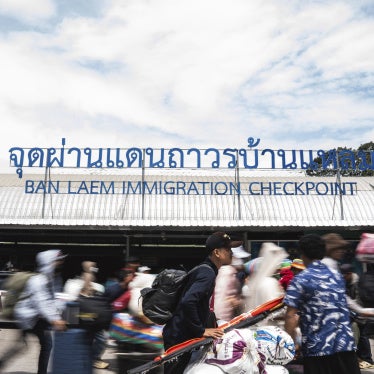(Tokyo) - A defamation lawsuit against a human rights defender who blogged against violations of migrant worker rights threatens to chill debate on matters of public interest in Malaysia, Human Rights Watch said today. In a case currently before the Malaysian courts, the Malaysian subsidiary of Asahi Kosei Japan Co. Ltd. brought a defamation suit for 10 million ringgit (US$3.3 million) against Malaysian activist Charles Hector for his blog posts on February 8 and 9, 2011, criticizing the treatment of Burmese migrant workers at the company's facility.
Hector's blog posts were based on information gathered by interviewing 31 Burmese migrant workers. Two days before posting the information online, he emailed his allegations to the company seeking a response but received no reply. The company claims Hector's emails went to an account that was rarely used. Asahi Kosei filed a lawsuit six days later. The company's claims do not appear to contest the information about rights abuses in the blogs but rather assert that Hector mischaracterized the work relationship of the migrant workers who were not the company's responsibility because they were supplied by an outside firm and not placed on the company's direct payroll.
"The astronomical sums being demanded by Asahi Kosei threaten both to bankrupt the defendant and to intimidate labor and human rights defenders all over Malaysia," said Phil Robertson, deputy Asia director at Human Rights Watch. "A company's right to protect its reputation should not become a way to cut off important discussions of matters of public concern."
On February 17, Asahi Kosei obtained an injunction that prevents Hector from blogging about the company's treatment of migrant workers until the end of the trial, which could take many years. The trial is expected to begin on June 28.
On March 11, the Malaysian Bar issued a statement supporting Hector. Citing the Whistle Blowers Protection Act 2010, the Human Rights Commission of Malaysia Act 1999, and other laws, the bar stated that, "it is felt that it is best that the company does not continue to go after the ‘whistle blower' but rather to commence the necessary investigations and do the needful to ensure that all rights of workers that work in the company are not violated, and justice is upheld."
Migrant worker rights have long been a concern in Malaysia. Migrant workers frequently receive low wages, suffer from dirty and dangerous working conditions, and are prohibited from changing employers. Employers frequently seize migrant workers' passports, limiting their freedom of movement. Many migrant workers pay exorbitant recruitment fees to labor brokers in their home country and in Malaysia, making them effectively debt-bonded until they can pay back the fees. Ministry of Home Affairs regulations prohibit migrant workers from forming associations and unions. And a migrant worker who becomes undocumented faces arrest as an "illegal migrant" - male migrants found to be illegal are subject to caning, which is a form of torture.
For over a decade, the UN special rapporteur on the promotion and protection of the right to freedom of opinion and expression has noted that civil defamation laws, like criminal defamation laws, can improperly restrict freedom of expression. Abid Hussain, the special rapporteur in 2000, outlined a list of minimum requirements that civil defamation laws need to satisfy to respect the right to freedom of expression. Several pertain to lawsuits brought by private parties as well as by government officials, including:
- Sanctions for defamation should not be so large as to exert a chilling effect on freedom of opinion and expression and the right to seek, receive, and impart information. Damage awards should be strictly proportionate to the actual harm caused.
- Defamation laws should reflect the importance of open debate about matters of public interest.
- Where publications relate to matters of public interest, it is excessive to require truth in order to avoid liability for defamation; instead, it should be sufficient if the author has made reasonable efforts to ascertain the truth.
"Malaysia has an extremely poor reputation on freedom of expression," Robertson said. "Improving the right to a free airing of views on human rights issues won't be achieved by ‘privatizing' excessive restrictions on speech."








